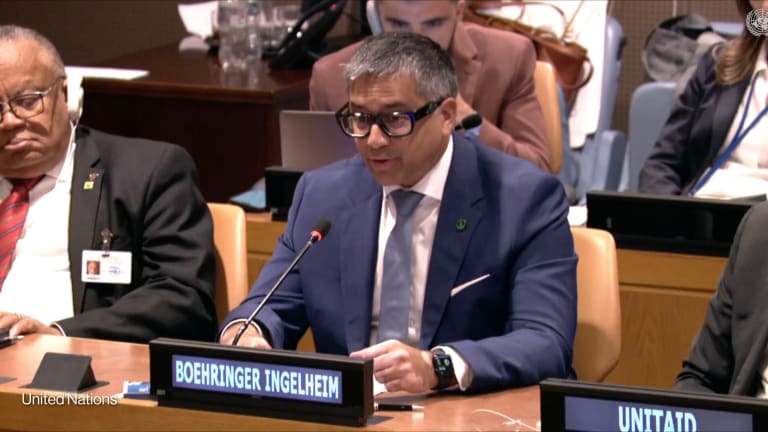
Noncommunicable diseases — heart disease, diabetes, cancer and chronic lung diseases, most notably — have grown to alarming proportions on our watch. These diseases are prematurely killing two out of three people today in all countries, rich and poor, with 80 percent of deaths being in lower-income countries.
Chronic diseases represent the defining global health challenge of our generation.
In India, people now get diabetes in their thirties and forties — 10 years earlier, on average, than people in Western countries. In a country where half a billion people are below 25 years of age, this makes the public health burden huge over the next few decades. NCDs have a devastating economic impact. At Arogya World, we recently conducted a survey of 10,000 women from 10 different countries, which showed that 25 percent estimate they spend a quarter of their household income on NCD treatment and care. In fact, 7 percent of the women believe they spend as much as half.
Think about it: Half of a family’s income spent on NCDs. That is quite simply unacceptable.
It is our generation’s responsibility to fix NCDs — to think, debate, challenge and goad. Or, as Sir George Alleyne, the acknowledged leader of the NCD movement, says, “agitate.” Governments and civil society, employers and employees, thought leaders and consumers must change policy and culture and behavior. Multisectoral approaches are needed for us to win.
The good news is that we know what to do. We know these diseases are largely preventable through lifestyle change. According to the World Health Organization, eating healthy foods, increasing physical activity and avoiding tobacco can prevent 80 percent of heart disease, 80 percent of Type 2 diabetes, and 40 percent of cancers.
Workplaces are where people spend a good part of their day, and if we can get workplaces to champion healthy living, we can make big strides against NCDs. Healthy workplaces are a smart solution to the NCD crisis. In fact, they are a win-win-win solution: The employer benefits through reduced absenteeism and increased productivity, employees benefit with improved health and the world benefits as it advances the fight against NCDs.
I have noticed some exciting ways people are using workplaces to prevent NCDs in recent months. These include mobilizing chief medical officers to get their companies to invest in workplace wellness, making workplaces smoke-free, recognizing the world’s healthiest workplaces with awards, and clever uses of technology.
At Arogya World, we are committed to leveraging workplaces as platforms for change. In India, we developed criteria that mark a workplace as “healthy” and therefore eligible for a healthy workplace award with multistakeholder input. These criteria are geared toward chronic disease prevention, requiring companies to discourage tobacco use, encourage healthy foods and physical activity, and support a work-life balance. They also require management to visibly embrace a healthy workplace culture.
Pioneering companies in India are adopting this external scorecard and are applying for our Healthy Workplace Awards. They respect our transparent assessment process and in-person site visits, and we in turn respect their investment in workplace wellness.
In September 2013, we made a Clinton Global Initiative commitment to get 100 companies in India to become healthy workplaces and to help 1 million working professionals lead healthier lives by 2016. In the last 15 months, more than 25 companies with about 200,000 employees from a variety of industries in India have accepted our challenge.
Next week, at a ceremony in Bangalore, we will mark World Diabetes Day and give Healthy Workplace awards to this year’s winners in India. Our next steps include giving our Healthy Workplace employers an easy way to keep their employees healthy. To that end we are launching our mHealth 2.0 effort and developing a chronic disease prevention mobile app targeting Indians.
This work is not easy. We must convince the leadership to invest in workplace wellness, one company at a time. And we need to make it easier for them to champion workplace wellness in a way that is not overly resource-intensive. More companies would apply if big industry organizations would endorse workplace wellness.
It would also help if government incentivized companies for investing in the health of their employees. And, to make real impact, this program needs to scale and become sustainable — something we need expert help in planning for and attaining. We want to calculate the return on investment from workplace wellness in India and use these data to convince more CEOs to invest in employee wellness.
Employee wellness is not a sexy global health topic. It is not new technology. It is not going to win any Grand Challenge competitions. But getting companies to change their culture and embrace healthy living is a solid step toward preventing NCDs in an entire generation of working professionals.
Private sector organizations big and small, this is your chance. This is your opportunity to participate in the global dialogue on NCDs. We call on you to simply care for the health of your own employees and take steps to help them prevent chronic disease. Nothing more. If enough companies in enough countries pay attention to workplace wellness, it will count.
At Arogya World, we have helped 150,000 people lead healthier lives with our mHealth and Healthy Workplace efforts in India over the last few years. By the time our organization is 10 years old, in 2020, we want to help 1 million. It’s this kind of measurable impact that spurs us on.
Want to learn more? Check out the Healthy Means campaign site and tweet us using #HealthyMeans.
Healthy Means is an online conversation hosted by Devex in partnership with Concern Worldwide, Gavi, GlaxoSmithKline, International Federation of Pharmaceutical Manufacturers & Associations, International Federation of Red Cross and Red Crescent Societies, Johnson & Johnson and the United Nations Population Fund to showcase new ideas and ways we can work together to expand health care and live better lives.
Read more #HealthyMeans articles:
● The next 'transformative change' leaders in global health
● #HealthyMeans tackling chronic disease
● How to help us live longer — and better — lives








